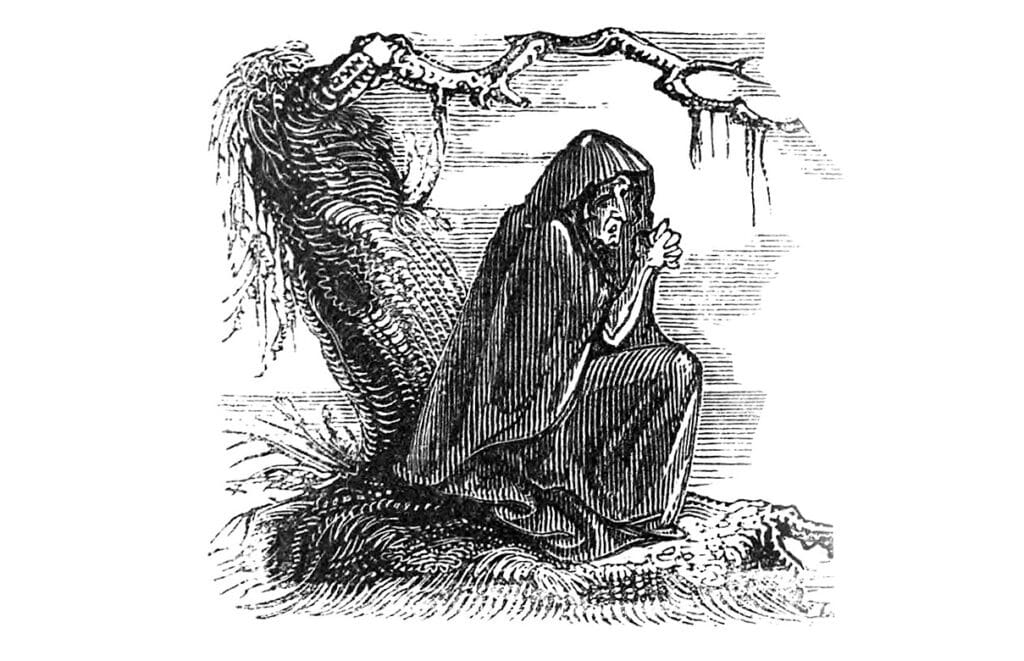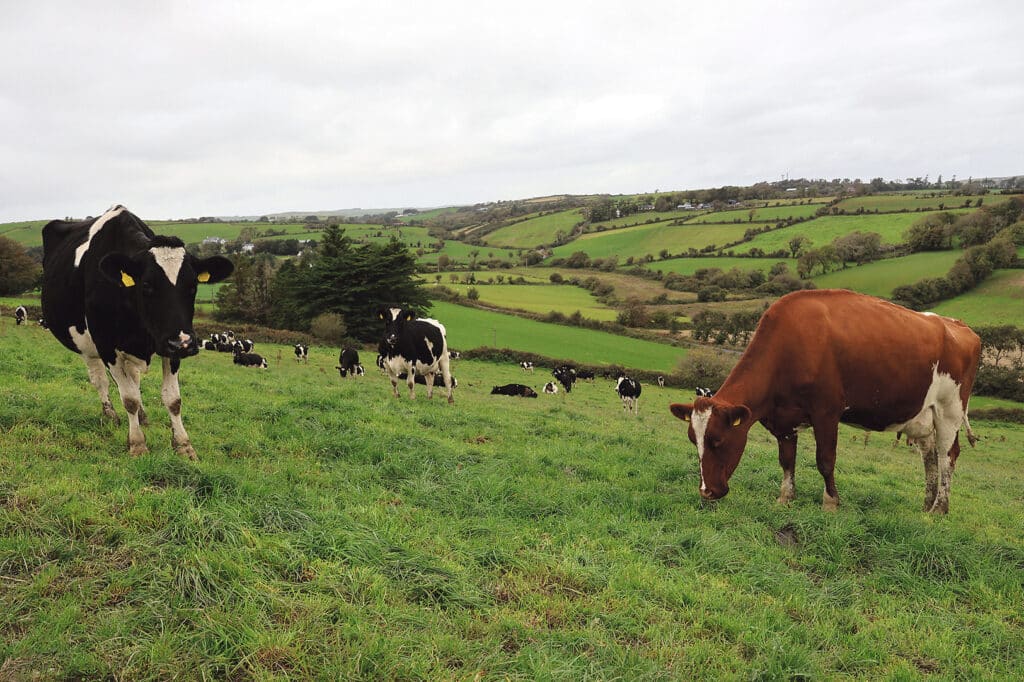The policy of replacing the Irish language with English began in the 14th century, but was largely unsuccessful until the nineteenth writes Eugene Daly.
The defeat of the Irish at the Battle of Kinsale in 1601 was the beginning of the end of the old Irish order, but the native language was the everyday language of the people, outside of the cities and big towns, up to the nineteenth century. The national school system, set up in 1831, and the Great Famine of 1845-50, hastened the demise of the language. No Irish was taught in the national schools and children from Irish speaking homes were punished for speaking their own language. With the horror and deprivation of the Famine and the widespread emigration, Irish people began to associate Irish with poverty. They also realised that when they emigrated they would need English in the US and Britain, the destination of so many. The Irish people deliberately set out to learn English; what they created by 1900 was Hiberno-Irish, English spoken in an Irish way.
Irish continued to be spoken in remote areas, particularly along the western seaboard and the islands. While we still have areas where Irish is spoken – the Gaeltacht areas of Cork, Kerry, Galway and Donegal principally – and Irish words and phrases continue to enrich daily speech in rural Ireland; it’s to a lesser extent than fifty years ago. The English spoken in West Cork when I was young was strewn with Irish words, phrases and turns of speech. Of course, Irish continued to be spoken in parts of West Cork up to the middle of the twentieth century, so the people of Heir Island, say, spoke English in an Irish way, including many Irish words, phrases and turns of speech.
The following is a sample of the words remembered from my youth. I will confine myself to a sample of words beginning with the letters a to d, as a more complete list would fill many pages.
The adjective ‘ainnis’ (angish) means ‘miserable, poorly, not feeling great’. A miserable sickly person could be called an ‘ainniseoir’, – ‘I am feeling angish after the flu’.
‘Airy’ from the Irish word ‘aerach’, means light-hearted, full of the joys of life. It can also have connotations of spookiness or the otherworld. In William Allingham’s well-known poem, ‘The Fairies’, we read:-
‘Up the airy mountain,
Down the rushy glen
We daren’t go a-hunting
For fear of little men’.
When addressing a person in Irish, one uses a (the vocative case), so talking to Seán, say, you say ‘A Sheáin’. There are many terms of endearment in Irish, many of which I heard the women of Heir Island use when I was young, for example a ‘chuid’ (my store, my all); a ‘chuisle’ (my pulse, literally); a ‘lao’ (literally, my calf); a ‘stór’ (my treasure) a ‘mhúirnín’, (my loved one); a ‘rún’, (my darling).
‘Amadán’ is the Irish word for a fool. An ‘amadán’, of course, is a male fool’; a foolish woman is an ‘óinseach’. ‘Anam on diabhal’ is an expression of surprise or displeasure (as on hearing surprising news). More usually expressed in the form ‘Th’anam on diabhal’, the phrase literally means ‘your soul to the devil’. In its original form it is an evil curse, but it has lost its original meaning and is used instead as a general purpose exclamation.
‘Anseo’ (here!) is the answer given at roll call in schools. Paul Muldoon in his poem ‘Anseo’ from ‘Why Brownlee Left’, writes:
‘Anseo, meaning here and now,
All present and correct,
Was the first word of Irish I spoke’.
‘Banshee’, from the Irish ‘bean sí’ (fairy woman) is a female spirit who wails in sympathy near the houses of certain families when the death of an occupant is imminent. She was usually seen combing her long grey hair. In ‘The Banshee’s Song’ by J.L. Forrest we read:

‘O’er the wild heath I roam,
On the night wind I come,
And beauty shall pale at the voice of my wail.
Hush! Hark to my tidings of gloom and sorrow
Go weep tears of blood, for – Och!
D’éag an corra (the dear one died)’.
Barmbrack, from the Irish ‘báirín breac’ (speckled loaf) is a large loaf made with flour, sugar, dried fruit and spices, generally popular, but particularly associated with Hallowe’en, containing tokens such as a ring, a piece of cloth, a little stick, etc, the ring meaning marriage etc. Winifred Letts wrote in the poem ‘Hallowe’en’.
‘Twas Thesie cut the barmbrack and found the ring inside,
Before next Hallowe’en has dawned, herself will be a bride’.
The Irish word ‘bán’ means ‘white’ or ‘fair-haired’. It is also a term of endearment as in the Irish poem, ‘Buachaill Bán’, by West Cork poet, Seán Ó Coileáin.
‘Beart’ is an Irish word meaning a parcel or a bundle. A ‘beart’ of hay was what one could carry on one’s back. ‘Give a beart of hay to the cows’ a person might say.
‘Bligéard’ (in English ‘blackguard’) is a caffler, a trickster. ‘Blackguarding’ is now used with the sense of not very serious teasing or misleading, as in, ‘sure I was only blackguarding when I said she was kissing Mikey’.
‘Blas’ (Irish, flavour, taste) is a complimentary word applied to one who speaks the Irish language well. The word also means the taste or flavour of food. An Irish proverb claims ‘Bionn blas ar an mbeagán’ (A little has a good taste).
‘Bothán’ is an Irish word for a hut or hovel, a run-down or neglected building. ‘Bothantaíocht’ is a word for the custom of informal evening visiting, for gossip, stories, card-playing, music or perhaps dancing. Informal dropping in to visit a neighbour was very common in my youth, but sadly, it has to a great extent, died out. The usual word for it in West Cork was ‘scoraíocht’. To visit a neighbour’s house at night was said to be going ‘scoraíochting’.
A boreen is the anglicised version of the Irish word ‘bóithrín’ (little road) a path. John Betjeman in his poem, ‘Ireland with Emily’, wrote:-
‘Bells are blooming down the bohreens,
White the mist along the grass,
Now the Julias, Maeves and Maureens
Move between the fields to Mass’.
‘Buachalán’ or ‘buachalán buí’ is the Irish name for ragwort. Ragwort grows widely on poor soil, is poisonous to cattle and was considered a sign of a neglectful or lazy farmer. As a young boy I saw posters about noxious illegal weeds in the post office. The local Garda would occasionally come by on his bicycle to instruct the errant farmer to weed his fields.
‘Brosna’, an Irish word, borrowed directly in Anglo-English for small sticks or twigs, for kindling a fire, often collected in ditches and hedgerows. ‘Brosna’ is also the title of a collection of poems by Irish language poet, Seán Ó Ríordáin. ‘Brus’ is a word borrowed from Irish, meaning small fragments, broken straw, dust. It is also used to connote small change as in ‘I only have brus in my pocket’. Bruscar (Irish for ‘fragments’) is a commonly used term for rubbish, in its original meaning close to ‘brus’. A ‘bosca bruscain’ is a dustbin.
‘Bualadh bos’, literally ‘banging of palms of the hands’, is the Irish term for applause. It is frequently used by the compére or ‘fear an tí’ (literally man of the house) asking the audience to applaud a singer, musician, etc. The Irish word ‘bos’ means the palm of the hand and also the wide part of a hurling stick.
‘Mar dhea’ means ‘in pretence’ and was commonly used in everyday speech as in, ‘he was reading the paper ‘mar dhea’ (by the way) when I was trying to talk to him’.
A ‘cábóg’ is an Irish word for a clown or an eejit, used pejoratively to mean an ignorant or backward person. It is sometimes used in phrases like ‘an ignorant cábóg’.
Caboose, from the Irish, ‘cabús’, is a nook or cranny in old houses in which were stored precious items like tea, tobacco, money, documents and so on. It could also mean a small house, as in, ‘put the dog into his caboose’.
A ‘caorán’ means a clod or fragment, used to describe a small hand piece of dry turf such as might be used for lighting a fire.
‘Céad mile fáilte’ (in Irish, a hundred thousand welcomes) is a universal Irish greeting. It comes from a poem ‘Eibhlín, a rún’ (Eileen, my love) written by the poet, Cearbhall Ó Dálaigh (c1597-1630), – ‘Céad mile fáilte, Eibhlín a rún’.
‘Ceol agus craic’ (in Irish music and craic) is used to describe an evening or weekend of sessions in pubs, drinking, singing and dancing.
‘Ciaróg’ is the Irish word for a beetle. It occurs in an Irish proverb, ‘Aithníonn ciaróg ciaróg eile’ (one beetle recognises another). The equivalent in English would be, ‘Birds of a feather flock together’.
‘Cnáimhseáil’ is an Irish word meaning to grumble, complain. A person might be described as a terrible ‘cnáimhséailer’ and one who complains a lot is said to be, ‘cnáimseáiling’.
‘Codladh grifín’ is an Irish phrase indicating numbness, or ‘pins-and-needles’, in the limbs. The Irish words ‘codladh’ and ‘grifín’ both mean sleep.
‘Cogar’, an Irish word for whisper, conspire, is used in Hiberno-English to request attention to a story or question as in ‘Listen (Come here)’. Cugger-Mugger – whispering, low-voiced gossiping, from the Irish word ‘cogar’ (whisper) with a duplication rhyme word. Shakespeare uses a similar phrase in Hamlet – ‘hugger-mugger’.
‘Corragiob’ is the Irish word for haunches. It is used in Hiberno-English phrases like, ‘he was sitting on his corragiob’, meaning squatting or sitting on one’s haunches.
Crubeen (from the Irish crúibín) is the Hiberno-English for pig’s trotter boiled and eaten from the hand. Commonly eaten in my youth (as were pig’s heads), it was considered a delicacy and went well with a bottle of porter.
‘Dallamullóg’ is an Irish word for blindness, concealment, used in Hiberno-English for bluff or deception. To put a ‘dallamulóg’ on someone is to ‘pull the wool over their eyes’.
‘Deiseal’ (from Irish ‘deis’ – right-hand) means turning to the right, following the sun, clockwise. Proceeding in that direction was regarded as lucky. Fisherman leaving harbours would always turn the boat ‘deiseal’. Proceeding in the opposite direction, known as ‘widdershins’, was considered unlucky.
‘Dríodar’ is an Irish word for waste, dregs, commonly used in Hiberno-English to mean the dregs or residue of a liquid or drops left in the bottom of a cup. ‘There’s nothing but old ‘dríodar’ left. I’ll make a fresh pot of tea’. Tomás Ó Criomthain from the Blasket Islands, in the opening sentence of his masterpiece, ‘An tÓileánach’ – the Islandman, writes: ‘Is mise dríodar an chruiscín, deireadh an áil’ – I am the dregs of the mug, the runt of the litter. Tomás was the youngest of a large family.



